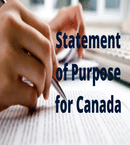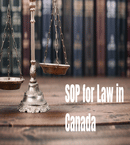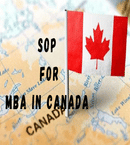Admission in Canada is offered to international students across undergraduate, postgraduate and professional courses. Canada is one of the leading countries in the world for international student population with 388,782 students enrolled in higher education programs. In the past decade, universities in Canada have experienced a significant growth of international students from 7.2% to 17.8%.
The universities in Canada accept Indian students with degrees from recognized higher education institutions. You will need an IELTS or equivalent test score as a proof of English proficiency to enter the universities in Canada. You might also need competitive scores in entrance examinations like GRE or GMAT for admission to select graduate programs. Students should demonstrate academic and professional LORs, SOP, Resume, professional experience and related documents for specific courses.
|
Table of Content |
How to get Admission to Canada?
The application process for admission to Canada varies based on universities, course types and admission sessions. Some of the key factors to consider before applying to study in Canada are as follows:
- Eligibility for admission
- Documents required for admission to the specific program
- Language proficiency requirements
- Application process
- Application deadlines
- Decision dates
- Canada student visa eligibility criteria and application process
Canada Application Process
The step by step process of applying for admission to the universities in Canada is provided below:
- Step 1: Choose a suitable program for yourself. Check for universities offering the program.
- Step 2: Check the intakes in which students are enrolled. The intake process in Canada is generally conducted in the academic terms of Fall, Winter, or Spring.
- Step 3: Visit the websites of the universities you are interested in and check for the application process, application deadlines, admission requirements for international students (check country specific requirements if available).
- Step 4: Apply to the university through the official application portal, pay the application fee and submit all the supporting documents.
- Step 5: Wait for the decision to be released by the university. If selected, you can confirm your admission within the stipulated deadline.
- Step 6: Apply for a Canada student visa. You need to demonstrate your proof of acceptance from a Designated Learning Institution (DLI) with a letter of acceptance from the university.
- Step 7: You can apply to the scholarships available for international students to fulfill your financial requirements for the program. International students are offered with various need or merit-based scholarships to study in Canada.
Admission Requirements in Canada
The admission requirements in Canada widely vary based on the university, program type, and citizenship of the student. A list of the documents generally required for admission to the undergraduate and graduate programs in Canada is provided here:
- Completed application form(s)
- Academic transcripts and related certificates of high school, undergraduate or graduate degree (if available)
- Course-specific standardized test score
- SOP for Canada
- Letter(s) of Recommendation
- 1-2 academic LOR (from teacher or academic supervisor)
- 1-2 professional LOR from professional supervisor or co-workers (if available)
- Language proficiency test score (English proficiency is required for majority of the programs, French proficiency is required for a few courses)
- Scanned copy of passport
- Canada student visa
- Photograph
- Updated CV or resume
- Proof of finance availability
- Proof of professional experience (if any)
Note: Some universities in Canada might require your physical interview after the initial selection process.
English Proficiency Requirements in Canada
International students from a non-English speaking country need to demonstrate their proficiency in English for admission to the Universities in Canada. You can demonstrate your English proficiency with competitive scores in IELTS, TOEFL, PTE, Duolingo and few other tests. The following table consists of some of the top universities in Canada and the minimum English language proficiency test scores required for admission.
| University | Minimum IELTS Score for UG Courses | Minimum IELTS Score for Graduate Courses |
|---|---|---|
| University of Toronto | 6.5 (6.0 in each section) | 6.5 (6.0 in each section) |
| McGill University | 6.5 overall, 6.0 in each component | Band score of 6.5 |
| University of British Columbia | 6.5 (6.0 in each section) | 6.5 (6.0 in each section) |
| University of Alberta | 6.5 (6.0 in each section) | 6.5 (6.0 in each section) |
| University of Ottawa | 6.5 band score | 6.5 band score |
| McMaster University | 6.5 (6.0 in each section) | 6.5 with 5.5 in each section |
| University of Montreal | - | 6.5 |
| University of Waterloo | 6.5 overall,Writing and speaking: 6.5Reading and listening: 6.0 | 7.0 (6.5 in each section) |
| Western University | 6.5 | 6.5 |
| University of Calgary | 6.5 | 6.5 (6.0 in each section) |
| Queen’s University | 6.0 (5.5 in each component) | 6.5 (6.0 in each section) |
| Simon Fraser University | 6.5 (6.0 in each section) | 7.0 (6.5 in each section) |
| Dalhousie University | 7.0 band score | 6.0 band score |
Standardized Test Score for Admission to Canada
International students need to submit course-specific standardized test scores for admission to various graduate programs in Canada. Following are some of the popular exams for admission to Canada and the scores required.
| Program Type | Test | Average Score Required |
|---|---|---|
| MS and related courses | GRE | 300-320 |
| MBA and other business courses | GMAT | 500-600 |
| MD | MCAT | 490-500 |
Graduate Admissions in Canada
Admission to the graduate programs in Canada is moderately competitive. For the majority of the master’s programs, students need a good bachelor’s degree. A GPA of 3.0 on a 4.0 scale is considered as the minimum requirement to apply for admission to the top universities in Canada. For master’s programs, a competitive GRE or GMAT score can add value to your application. Following are some of the top universities in Canada for graduate courses and their application fees:
| University | Graduate Application Fee (CAD) | Fee for Indian Students (INR) |
|---|---|---|
| University of Toronto | 125 | 7,640 |
| McGill University | 125.71 | 7,680 |
| University of British Columbia | 168.25 | 10,285 |
| University of Alberta | 135 | 8,250 |
| University of Calgary | 145 | 8,870 |
| Queen’s University | 110 | 6,730 |
| Simon Fraser University | 125 | 7,640 |
| University of Ottawa | 75 | 4,590 |
| McMaster University | All Programs: 110 | 6,730 |
| MBA and MS in Finance: 150 | 9,175 | |
| University of Montreal | 112 | 6,850 |
| Dalhousie University | 115 | 7,035 |
| University of Waterloo | 125 | 7,640 |
| Western University | 150 | 9,175 |
Undergraduate Admissions in Canada
In Canada, the majority of the undergraduate students are enrolled in the spring semester. A list of the top universities in Canada enrolling undergraduate students, their application deadlines and application fees are as follows:
| University | Program | Undergraduate Application Deadline |
|---|---|---|
| University of Toronto | All programs | January 12, 2023 |
| Bachelor of Information | June 4, 2023 | |
| Medical Radiation Sciences | February 1, 2023 | |
| Nursing | January 15, 2023 | |
| Physician Assistant | January 17, 2023 | |
| McGill University | All programs | January 15, 2023 |
| University of British Columbia | All programs with few exceptions | Winter and Summer: January 15, 2023 |
| University of Alberta | Most programs | March 1, 2023 |
| University of Ottawa | Science | Fall: April 1, 2023 |
| Engineering | Fall: March 1, 2023 and April 1, 2023 | |
| Arts | Fall: April 1, 2023 | |
| McMaster University | Arts and Science, Business, Computer Science and related courses | January 12, 2023 |
| University of Waterloo | Most Programs | February 1, 2023 |
| Western University | Full time first year programs (early consideration) | March 1, 2023 |
| University of Calgary | All programs | Fall: March 1, 2023 |
| Nursing | Winter: September 1, 2023 | |
| Energy Engineering | Spring: February 1, 2023 | |
| Community Based Education | Summer: March 1, 2023 | |
| Queen’s University | All first year programs | February 1, 2023 |
| Simon Fraser University | Undergraduate programs | Fall: January 31, 2023 |
| Summer: January 15, 2023 | ||
| Spring: September 15, 2022 (Closed) | ||
| Dalhousie University | Bachelor of Science, Arts, Computer Science and Engineering | January 2023 Entry: November 15, 2022 September 2023 Entry: April 1, 2023 |
| Bachelor of Health Sciences | February 15, 2023 | |
| Bachelor of Science (Nursing) | February 28, 2023 | |
| Bachelor of Environmental Design Studies | March 1, 2023 | |
| Bachelor of Science (Medical Sciences) | March 15, 2023 | |
| Bachelor of Agriculture (International Food Business) | July 1, 2023 |
Do you know the best intakes to study in Canada? Click below and get full information about it.
Considering the ultramodern education facilities, admission in Canada is a wise choice. The admission requirements in Canada are comparatively more achievable than countries like USA. Remember, the university might require you to apply early for scholarships.
FAQs
Ques. How can I get admission to Canada?
Ans. For admission to Canada, international students need a high-school degree, undergraduate degree or graduate degree from a recognized university. The top Canadian universities expect a minimum GPA of 2.5 to 3.0 on a 4.0 scale (77 to 86%) from prospective students. You must acquire a Canada Student Visa to secure admission.
Ques. Do I need IELTS to study in Canada?
Ans. Indian students need a competitive IELTS score or equivalent English proficiency test score for admission to Canada. A minimum IELTS score of 6.0 is the minimum requirement for admission to the majority of the universities in Canada.
Ques. What month is Fall admission in Canada?
Ans. The Fall applications in Canada are generally accepted between September and December. Some universities also accept students for the fall term post application deadline, based on the seats available.
Ques. Can I get free admission in Canada?
Ans. Students can secure admission in Canada for free with tuition and living expenses being waived by scholarships and grants. In Canada, universities and private organizations assist students financially by offering up to 100,000 CAD (61 lakhs INR).
![University of Toronto [U of T]](https://static.zollege.in/public/college_data/images/studyabroad/logos/college_104_25-12:44_University_of_Toronto-logo-2417C8AF32-seeklogo.jpeg?tr=w-50,h-50,c-force?tr=h-40,w-35,c-force)
![The University of British Columbia [Ubc]](https://static.zollege.in/public/college_data/images/studyabroad/logos/college_64_25-11:13_Capture.jpeg?tr=w-50,h-50,c-force?tr=h-40,w-35,c-force)
![McGill University [Mcgill]](https://static.zollege.in/public/college_data/images/studyabroad/logos/college_39_24-17:26_macgill.jpeg?tr=w-50,h-50,c-force?tr=h-40,w-35,c-force)
![University of Montreal [U de M]](https://static.zollege.in/public/college_data/images/studyabroad/logos/college_71_24-17:54_udem.jpeg?tr=w-50,h-50,c-force?tr=h-40,w-35,c-force)
![Simon Fraser University [Sfu]](https://static.zollege.in/public/college_data/images/studyabroad/logos/college_54_25-11:01_Capture.jpeg?tr=w-50,h-50,c-force?tr=h-40,w-35,c-force)
![University of Alberta [UAlberta]](https://static.zollege.in/public/college_data/images/studyabroad/logos/college_9_24-17:46_alberta-.jpeg?tr=w-50,h-50,c-force?tr=h-40,w-35,c-force)







1598556405.png?tr=w-305,h-145,c-force?tr=h-130,w-130,c-force)

1599027260.png?tr=w-305,h-145,c-force?tr=h-130,w-130,c-force)


